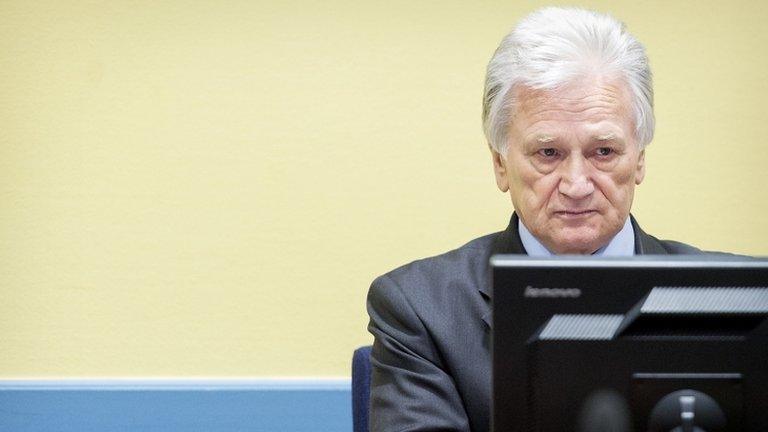Ratko Mladic war crime defence begins
- Published
Ratko Mladic appeared at the trial wearing a dark suit, as Anna Holligan reports
The defence in the trial of former Bosnian Serb army chief Ratko Mladic on charges of genocide and crimes against humanity has opened in The Hague.
The first witness, a former Serb army officer, says he was never ordered to fire on civilians in the besieged Bosnian capital of Sarajevo.
Mr Mladic, 72, is one of the most high-profile suspects, external to appear before the tribunal in The Hague.
Mr Mladic denies 11 charges dating to the 1992-95 Bosnian war.
Mile Sladoje, a former assistant commander of a Serb battalion in Sarajevo, was the first witness called by Mr Mladic on Monday.
In a summary of his testimony read at the hearing, he denies ever being ordered by Mr Mladic to target civilians in a sniping campaign during the three-year siege of the city in which approximately 10,000 people were killed - most of them Muslims.
"All our activities [in Sarajevo] were defence activities... There were standing orders, fire could only be returned in response to enemy fire," he said.
"I know nobody gave orders to shoot civilians."


In court: Anna Holligan, BBC News, The Hague
Ratko Mladic is famous for his animated appearances. As the judge entered courtroom one, the ageing patriot stood, bowed his head and gave a slow salute. He then placed both hands on his heart and closed his eyes, followed by a quick glance through the bullet-proof glass, perhaps to make sure the journalists were taking note.
Two decades ago, he was a bolshie general, parading the battlefield in army fatigues. Today, he struggles to stand and grasp a thick, plastic-coated pen to make notes, his muscles still suffering from the effect of a series of strokes.
But his character remains intact. As Mile Sladoje told the court, their battalion did not have the "optical-sight" rifles that the prosecution claims were used by Serb snipers in Sarajevo, Mr Mladic nodded in earnest agreement. He enjoys engaging with the audience.
At 72, he has already outlived his superior, former Serbian President Slobodan Milosevic, who died of a heart attack aged 64 while on trial in The Hague.
A few months ago, Mr Mladic forgot his false teeth, and the trial was temporarily adjourned. With at least two years to go, survivors hope his health does not deteriorate further.

'Satanic'
Ratko Mladic's forces are accused of conducting a prolonged campaign of shelling and sniping, designed to kill and spread terror among the civilians of Sarajevo.
Mr Mladic is specifically accused of a role in the massacre of more than 7,000 Bosniak men and boys at Srebrenica - Europe's worst atrocity since World War II.
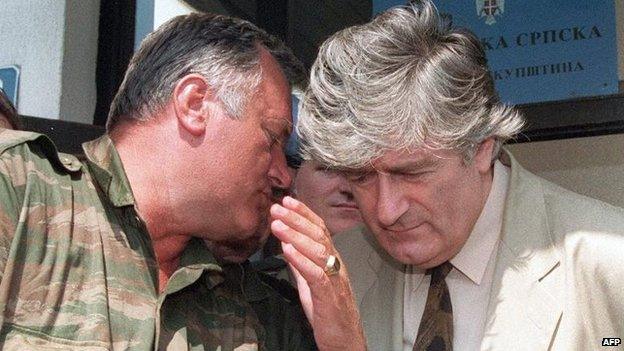
Ratko Mladic and Radovan Karadzic in Pale in 1993. Both men are accused of war crimes and crimes against humanity
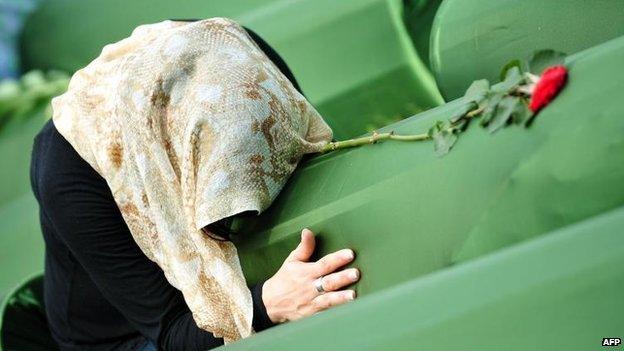
The Srebrenica massacre was the worst atrocity in Europe since the end of WW2
Mr Mladic has denounced the International Criminal Tribunal for the former Yugoslavia (ICTY) tribunal as "satanic".
The defence argues that Gen Mladic was simply a soldier following orders.
His lawyers have described him as a self-proclaimed patriot who fought to defend his people.
The defence will also attempt to refute the prosecution's claim that the general led a targeted campaign to ethnically cleanse parts of Bosnia of non-Serbs and make them part of a greater Serbia.
But they are expected to point out that Mr Mladic suffers from a memory disorder that makes it hard for him to differentiate between truth and fiction.
The BBC's Anna Holligan in The Hague says that although he denies the charges, many survivors consider Ratko Mladic to be one of those most responsible their suffering.
Our correspondent says that for them, the trial is a chance to hear the truth and experience some form of justice.
The defence has been given 207 hours to present its case, the same amount of time given to the prosecution.
There is no limit to the number of witnesses the defence can call.
In the Srebrenica enclave, Bosnian Serb forces overran the UN-defended safe area, killing Muslim men and boys in July 1995.
Ratko Mladic was the general in charge of the troops. He was on the run for 16 years before being arrested in 2011 in northern Serbia, where he had been living under an assumed name.
Also being tried in The Hague is former Bosnian Serb leader Radovan Karadzic, who like Mr Mladic is accused of war crimes and crimes against humanity.

Mladic trial
3 June 2011: Trial begins. Mladic says charges are "monstrous" and "obnoxious"
October 2011: Mladic admitted to Dutch hospital and in November found not to be in a condition to follow the trial (first of many suspensions over his health)
17 May 2012: Trial adjourned due to prosecution "errors"
18 June 2012: Trial suspended until further notice
9 July 2012: First witness heard
10 April 2013: Mladic removed from court after muttering during testimony of Srebrenica survivor
19 May 2014: Defence in trial begins

- Published15 April 2014
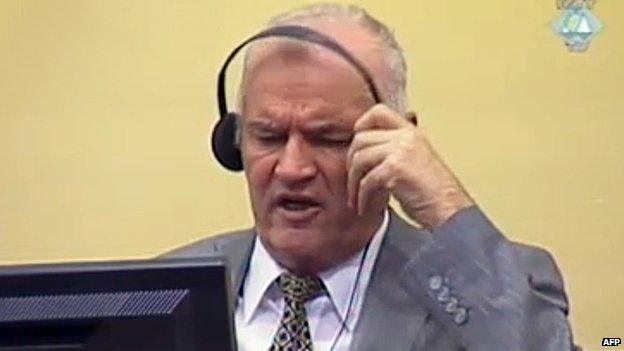
- Published28 January 2014
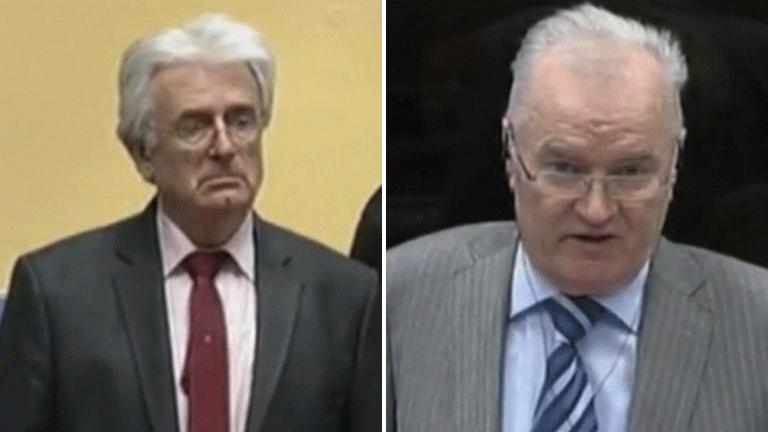
- Published22 November 2017
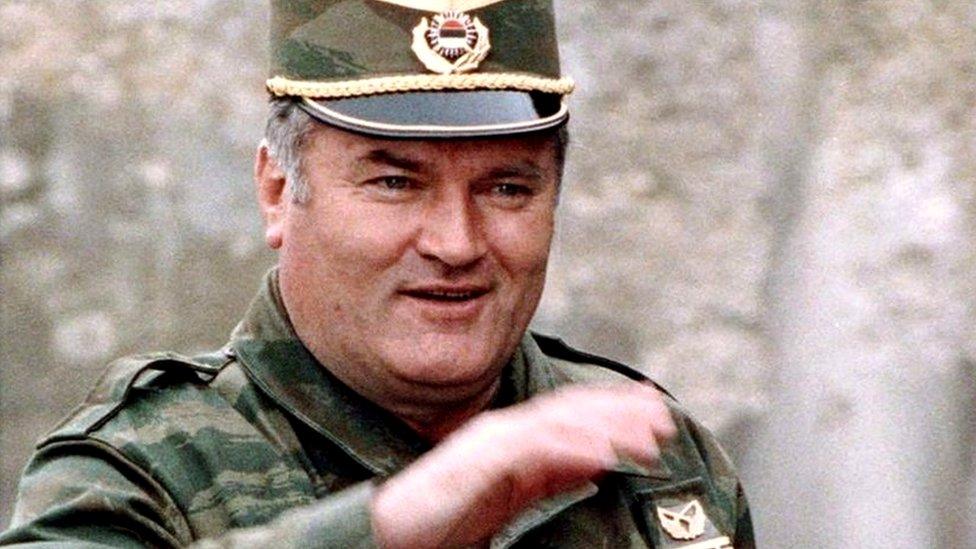
- Published3 June 2011
- Published19 June 2013
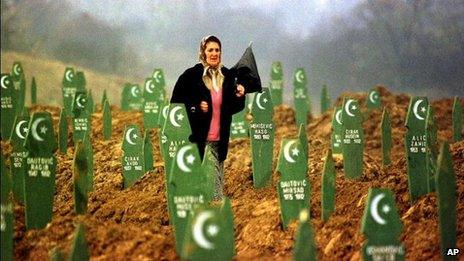
- Published28 February 2013
